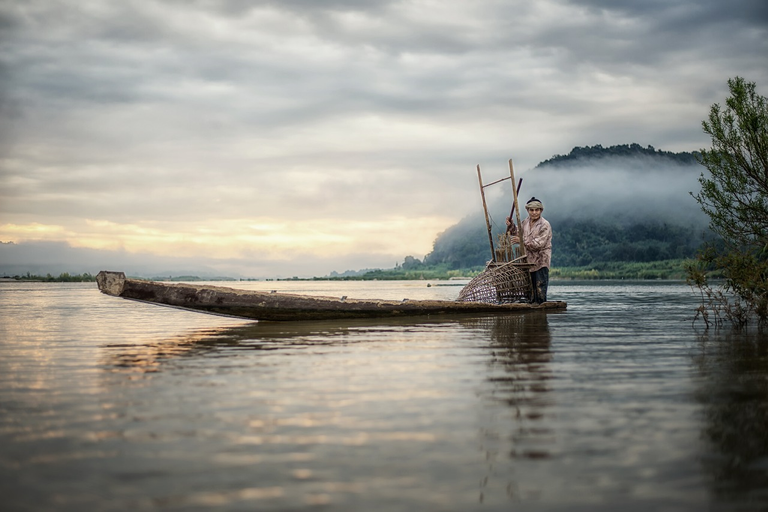The sun rose over the city of Niger Delta, casting a golden glow upon the Urhobo community where Oghene was born. As the river danced through the heart of the community, the scent of fertile soil mingled with the salty air.
Born into a humble family, Oghene seemed to enjoy the freedom of his childhood. Oghene and Ejiro, his friend, would roam the village, exploring the secrets hidden within the trees and the stories whispered by the wind. As the years unfolded, the village bore witness to the consequences of environmental degradation as the once-pristine river was polluted with oil spills.
Oghene's late father worked as a fisherman, every sunrise and sunset he would go with his son to fish. The river was so polluted that somedays they would come home without a fish, some lucky days they would catch a few. Oghene and his father would cast their net into hazy waters each morning, battling storms and setbacks with unbreakable spirits. Through their successes and setbacks, their resiliency increased, making them pillars of strength as they mapped out a prosperous future for their family. He became motivated by his father's unshakeable spirit. and so he decided to live out his father's legacy.
Oghene, now an undergraduate and also a determined young fisherman, He would come home every holiday to fish, sell, and make money for his education. As usual, he came home to embark on a tireless journey each day to a river marred by the relentless stain of oil spillage. Armed with nothing but his fishing net and an unwavering spirit, Oghene defiled the desolation that gripped the waters. With each cast, he navigated through the treacherous currents, grappling with the reality that fish were scarce. Yet, fueled by a profound resilience, Oghene pressed on, driven by a deep-rooted love for his craft, his community, and an unwavering hope for a future where the river would flow once again with the life-giving abundance it once held.
One faithful day, Oghene decided to talk to his mother about this frustrating situation. After dinner he joined his mother who was sitting under a mango tress at the middle of their compound.
Mama, he called, squeezing his fingers. His mother, who was engrossed with the egusi seeds she was peeling, looked up and noticed that he was looking sad and tired. She beckoned for him to sit on the wooden chair opposite her.I hope all is well, my son. No, Mama, all is not well. Something serious has been bothering me. Go on and share your worries, my son; I hope I will be able to help. Growing up as a boy, I would worry about how Papa and I would spend days fishing only to come home with few fishes, most times nothing. We barely had enough to eat; because our river is polluted; oil spills killing aquatic creatures; and our soil pollution killing our crops. We are mainly farmers and fishermen in this community, we have been impoverished by this horrible and frustrating situation. I’ve watched things remain the same until now, and I sincerely do not think that I can continue to sitback, watch and do nothing.
Oghene my son! his mother called grinning, Our village was once a prosperous community, she began. As you said, villagers are mostly famers and fishermen. They were driven by a shared vision of growth and prosperity. Education empowered the youth with knowledge and skills for the future, fostering a generation of critical thinkers and changemakers. Then came all these oil drilling companies, followed by oil spills. Oil spillage in our community unleashed a devastating tide of destruction as dark tendrils of crude oil slithered through once-pristine waters, suffocating life beneath its toxic embrace. The vibrant ecosystem that sustained generations crumbled; its delicate balance was shattered. Villagers, whose lives were intertwined with the river's bounty, watched helplessly as their livelihoods withered away. Your father and the generations before him could do little to change the narrative. But your generation is here; the baton has been passed on to your generation. She paused and took Oghene's hands, with the bit of the education you have acquired, i know you can champion this cause, she whispered in finality.
Yes Mama, this is time for action, he said nodding his head reaasuringly. I must see Ejiro my friend immediately.
Oghene was obviously exposed to a harsh world in which environmental destruction and poverty coexisted. Where families struggled to make ends meet, their dreams were obscured and dashed by the dark cloud of despair. The river, which was once a source of life, became a symbol of their struggles.Oghene, now a young adult, felt the weight of responsibility on his shoulders. Determined to create change, he mobilized the villagers, uniting them in a quest to restore their livelihoods and protect their environment. His friend Ejiro, provided his unwavering support with their flame of determination, fueled by their love for their village and their unwavering belief in a better future. Boldly, they moved to change the narrative. They faced resistance from powerful companies that sought to exploit their land and resources. Doubts clouded their minds, threatening to shatter their collective spirit. It was then that Oghene drew upon the resilience ingrained in his childhood experiences with his father.
Oghene and Ejiro, met the village high chiefs to solicit for their support and that of the villagers. In no time, the whole community started a peaceful protest against the comapanies, threathening to involve the Fedral Government. The companies in swiftly move to dialogue with the community, promising to salvage the situation. They established sustainable farming methods, coordinated clean-up efforts, and increased environmental awareness through community-driven projects. The river resumed its natural position as a source of plenty as the community gradually began to heal. As they banded together as a community to fight for justice and restoration to protect their land and reclaim the beauty that once thrived in the heart of the Niger Delta.





